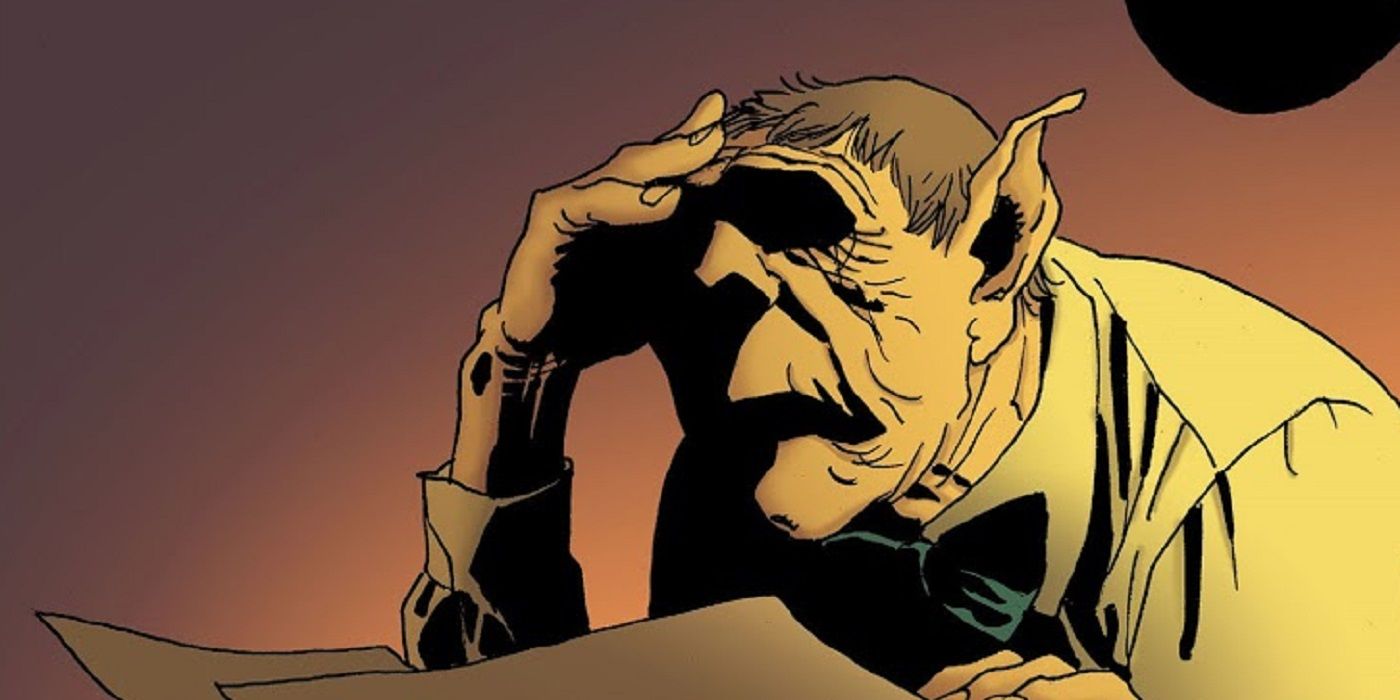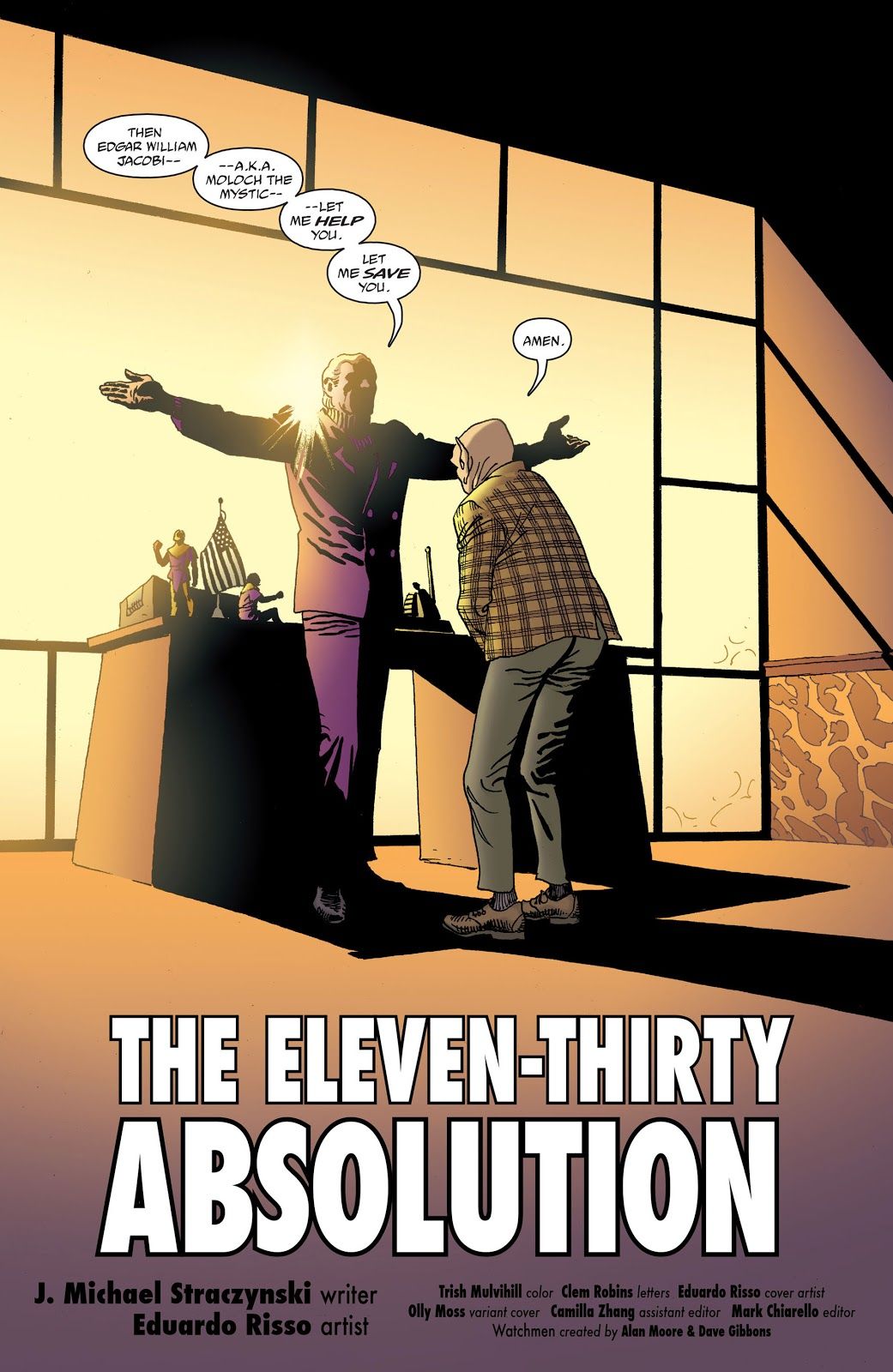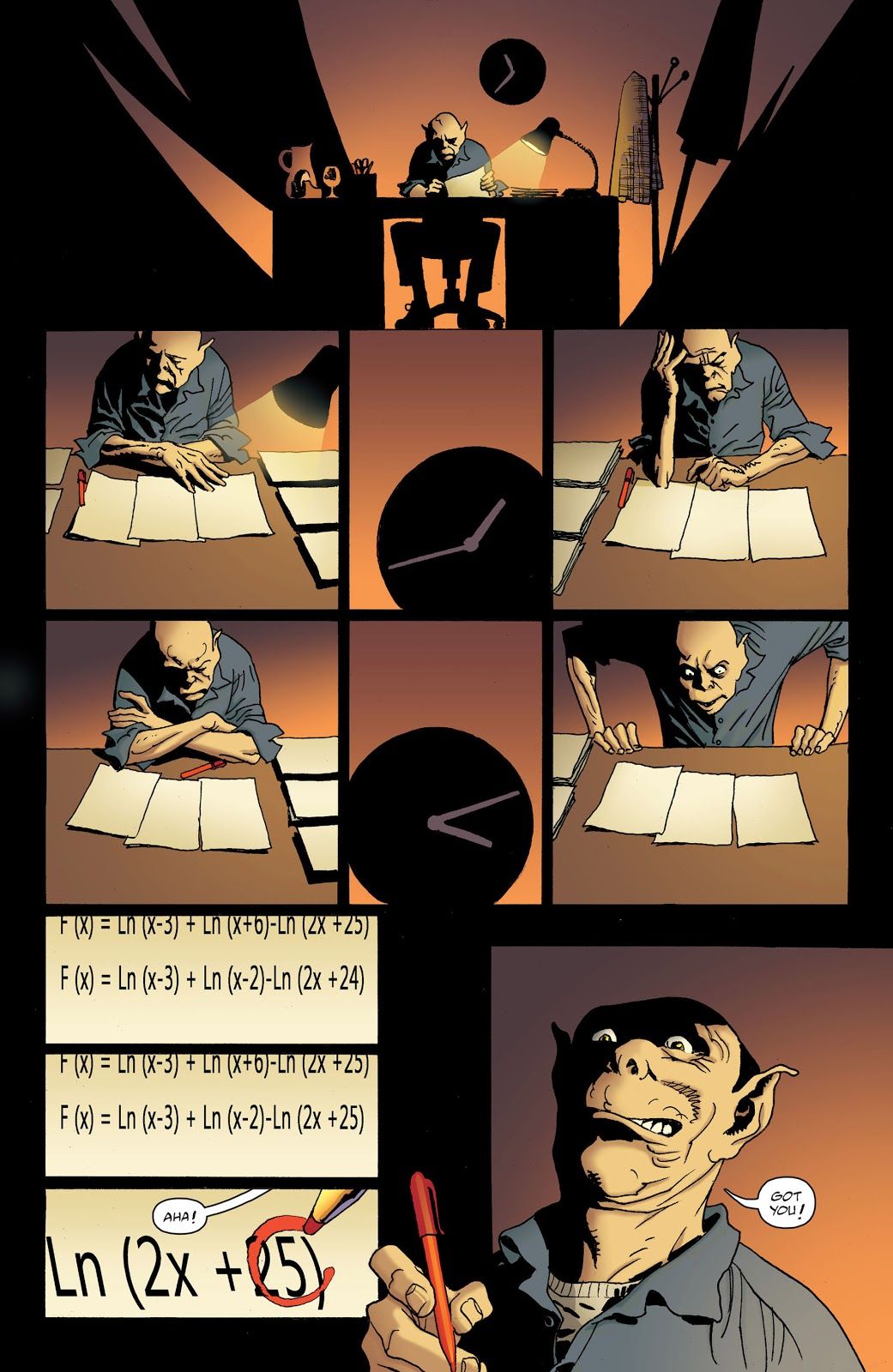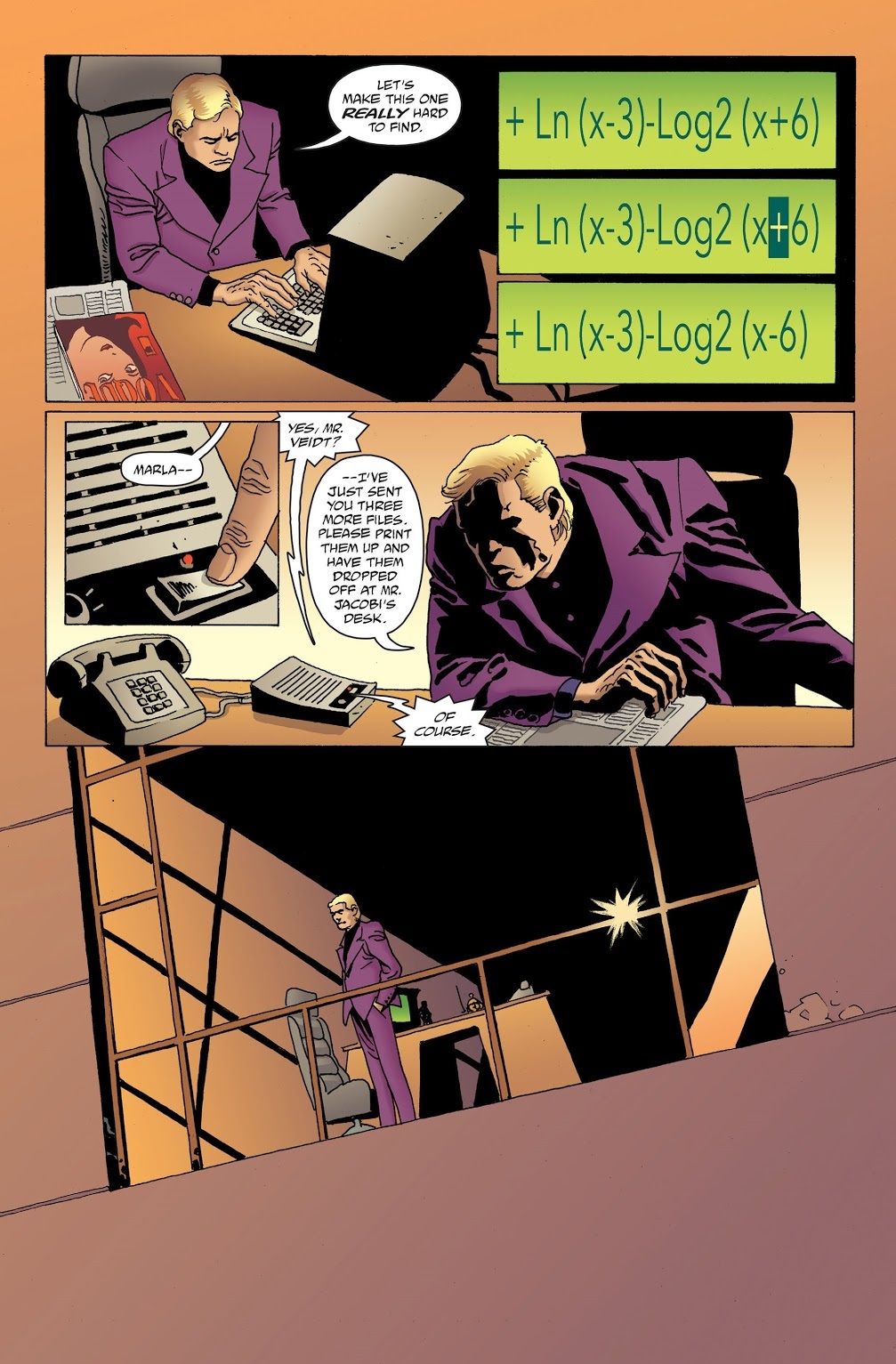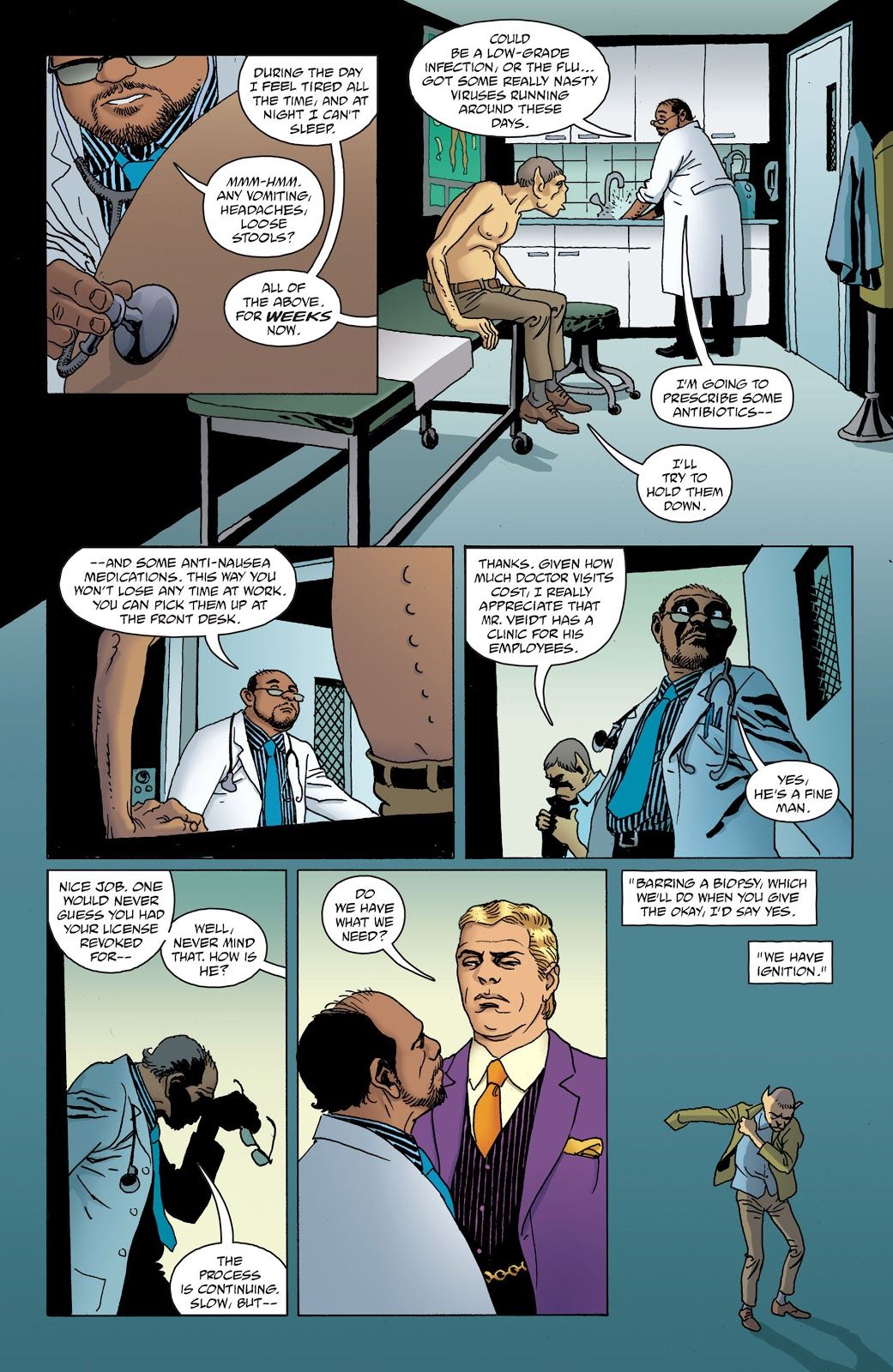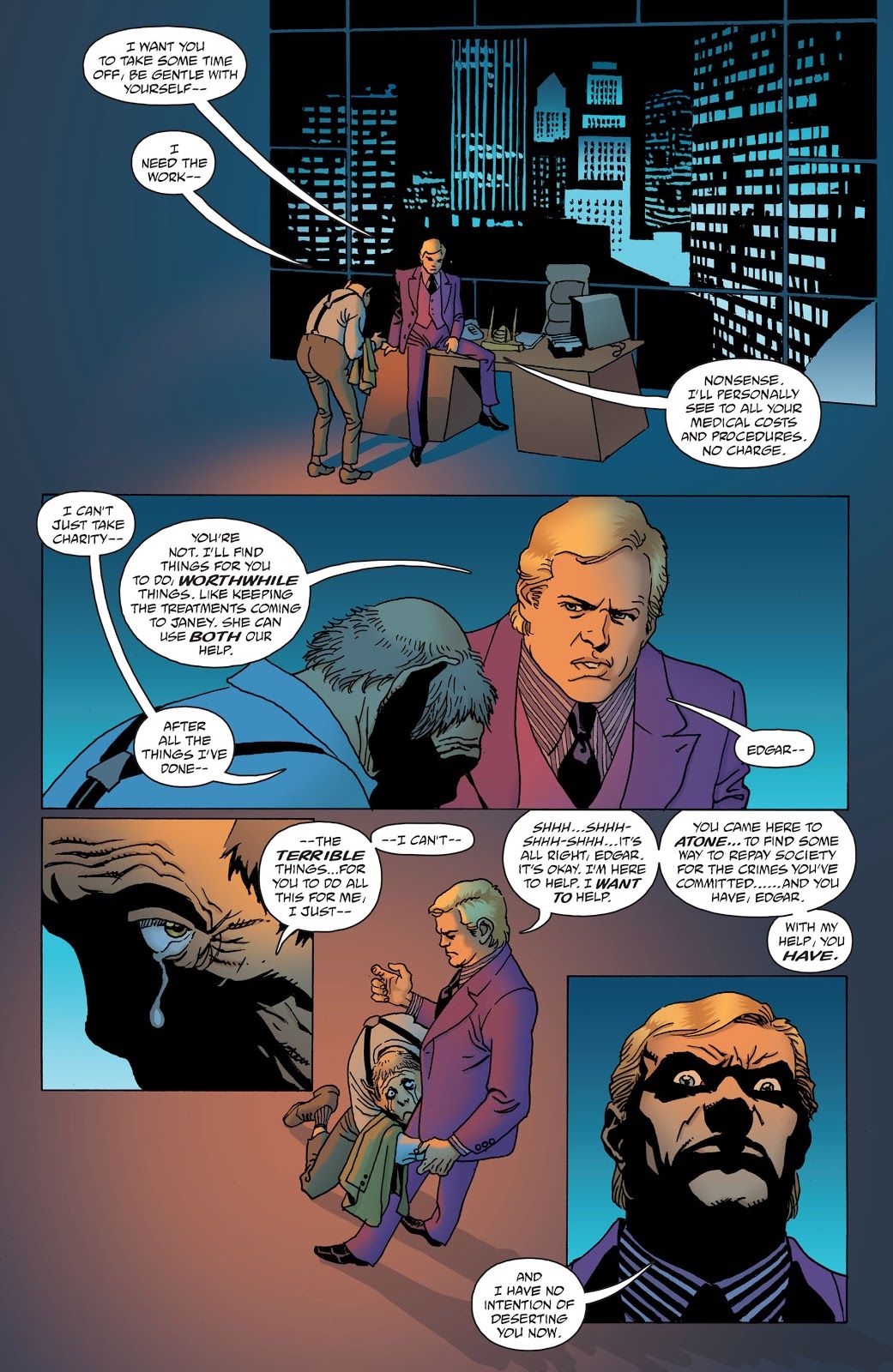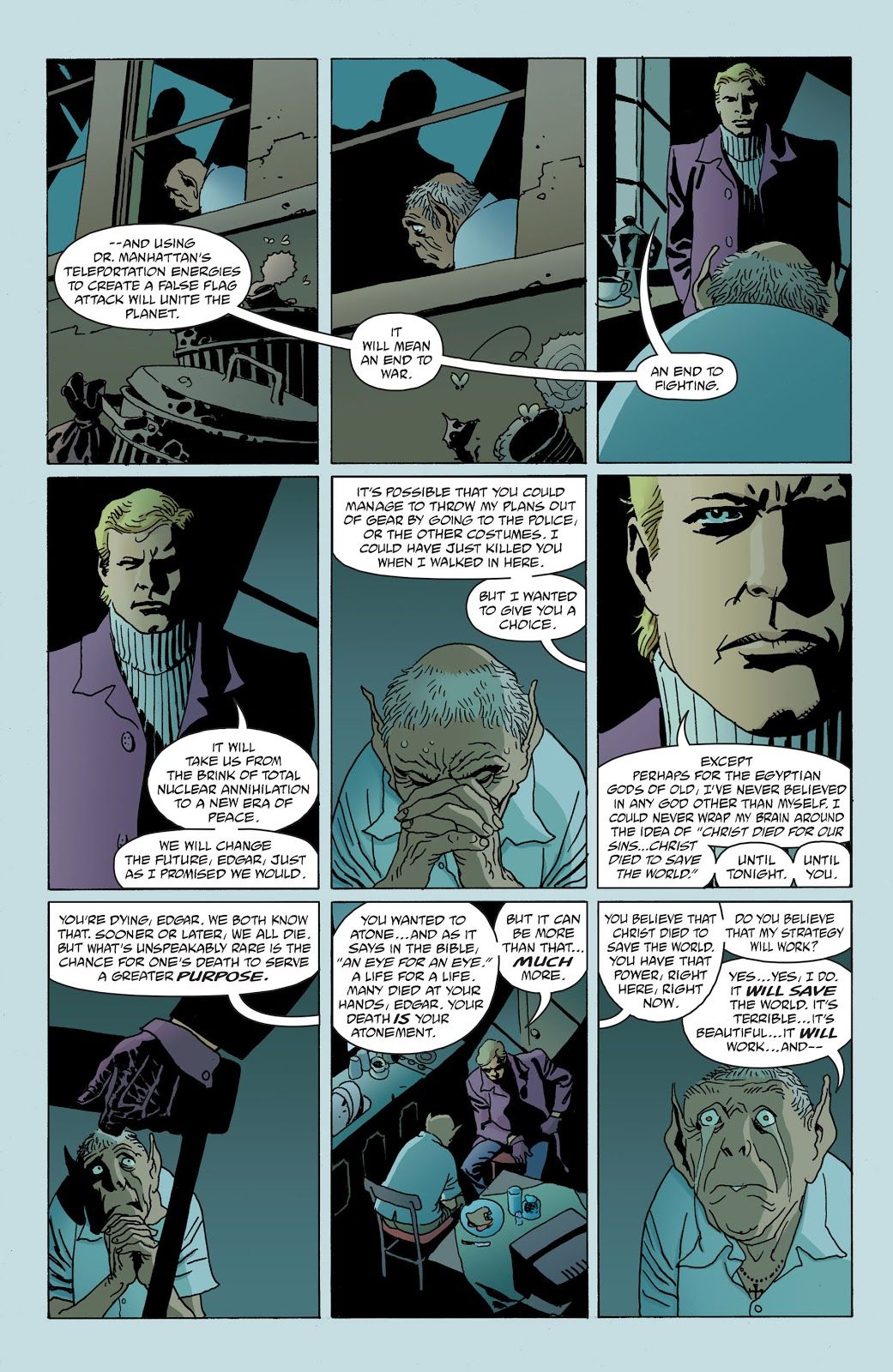Here is the latest installment of ...And the Superhuman Review, where Chad Nevett and Brian Cronin discuss each issue of DC's Before Watchmen event. Just, you know, eight years late. You can check out the earlier reviews here.
We continue with Before Watchmen: Moloch #2, "The Eleven-Thirty Absolution" by J. Michael Straczynski, Eduardo Risso and Trish Mulvihill
Brian Cronin: "Eleven-Thirty Absolution" SOUNDS like it's a phrase.
Brian Cronin: But I don't think it actually is, is it?
Chad Nevett: I've never heard it. I figure it's the reference to Moloch going along with Adrian's plan when the clock would be 11:30 in both real time and... well, kind of in Watchmen as a book?
Brian Cronin: Yeah, that's what it means, it just seems fascinating that it sure SOUNDS like it is a literary reference while not actually being a literary reference.
Brian Cronin: Maybe that's almost a metaphor for most of Before Watchmen.
Brian Cronin: It seems like it is literary, while, well...you know.
Chad Nevett: "Amen."
Brian Cronin: We talked last time about how this was a fill-in miniseries scheduled due to delays on the other series.
Brian Cronin: So, in an event that has been mostly filler, we now get a two-issue miniseries that is filler for the filler
Brian Cronin: And it's just that good!
Brian Cronin: The stunning thing about this issue, though, for me, is that the first issue was uneventful, but it at least was original.
Brian Cronin: Here, it's literally just filling in holes in a narrative that were clearly never meant to be filled.
Brian Cronin: And thus, never really were "holes" exactly.
Chad Nevett: The only one that it explained that ALMOST (key word) made me want to give it to JMS was how Adrian found out about Blake's discovery of his plan. But, even that didn't need anything to explain it as I believe Watchmen just pawned it off on Adrian bugging Moloch's place. So, wait, that was useless, too, here.
Chad Nevett: Has there ever been a writer more gung-ho to explain things that didn't need explaining than JMS?
Brian Cronin: Sadly, there have been many comic book writers who fit that bill.
Brian Cronin: Heck, Mark Gruenwald once invented a supervillain whose whole purpose was to kill off other supervillains
Brian Cronin: Because Gruenwald felt that there were too many supervillains not being used in the Marvel Universe.
Brian Cronin: And thus, it was illogical that there would be all of these villains off there without us ever seeing them.
Brian Cronin: And so he brought them back to be killed off.
Brian Cronin: So...yeah, JMS has a lot of company out there in comic book history.
Brian Cronin: And to be fair to Straczynski, this obviously wasn't planned by him.
Brian Cronin: So he was doing DC a solid by taking on this extra series.
Brian Cronin: But yes, that one of the top art teams of the last twenty years, Eduardo Risso and Trish Mulvihill, were spent on THIS is kind of disheartening.
Chad Nevett: The more I look at this comic, the more I like the way Risso just said "Fuck it" and did whatever he wanted with character looks. Not even a token attempt to get Moloch or Adrian on model. The only times you get the sense he's even read Watchmen are when he recreates the different scenes in Moloch's apartment.
Chad Nevett: But, it's interesting to see a rare instance in North American comics where he's paired with a writer other than Brian Azzarello. Turns out, Risso just does what Risso does.
Brian Cronin: Well, the Risso/Mulvihill Batman run with Azzarello was a perfect example of them not adapting to the character, but the characters are always going to adapt to their style.
Brian Cronin: And hey, their style is awesome, so more power to them.
Brian Cronin: One thing that I literally JUST noticed is that in the first issue, Moloch was cast in shadows a lot more.
Brian Cronin: While, once he is released from prison, he gets covered in shadows a lot less frequently.
Brian Cronin: And yet in this issue, it is instead Ozymandias who gets covered in shadow a lot.
Chad Nevett: It's because he's basking in the light that is Adrian...
Brian Cronin: And you can see it right from that first splash page
Brian Cronin: Where the sun is shining in, but Adrian's face is obscured.
Brian Cronin: But I really noticed it in the first page, when I was saying to myself, "Why does he look different?"
Brian Cronin: And I looked back to the first issue, and it's because Risso and Mulvihill have him covered in shadow for most of his adult scenes in #1.
Brian Cronin: And here, he's just his "normal" self and he's just so pathetic looking.
Chad Nevett: That's kind of his entire character in this issue: pathetic. He's a sniveling little goblin who does whatever Adrian asks and is glad to do it.
Chad Nevett: The only time he seems at all normal is when he's working.
Brian Cronin: And it makes the issue such a slog to get through.
Brian Cronin: And it seems so painful for Risso and Mulvihill.
Brian Cronin: What are they even doing here?
Chad Nevett: Getting paid.
Brian Cronin: Yeah, that really is it.
Brian Cronin: The money must have been great on these things and especially something with such a quick turnaround.
Chad Nevett: I've always wondered where Azzarello fell in this.
Chad Nevett: Was he asked? Did he turn it down?
Brian Cronin: I just checked and here's Straczysnki's answer.
Brian Cronin: "It was something that Dan DiDio wanted to do from day one, but once we had all picked or been given the main characters we were to handle, adding one more book into that mix might’ve been too much for this small group. As it turned out, I got all of my work in early and was free to take on this one as well, which I considered a very happy development as I very much wanted to tackle the Moloch characters. He’s really the only villain of note we hear much about during the original book, but by the same token his background wasn’t terribly well established, so there was a lot of room to play and develop his story."
Brian Cronin: So you gotta give Straczynski that much credit, at least he got his stuff done early.
Brian Cronin: That's...something.
Brian Cronin: I also came across a Straczynski point that I found interesting in that I don't know if I think it's even accurate.
Brian Cronin: He says of Risso, "And he does something very subtle in the books that I don't know if folks will notice. There are actually two looks to Moloch. When we're in something resembling an omniscient or third person point of view, he looks like a guy with somewhat distorted ears and appearance...but when we go subjective, when we close in on his point of view, on how he sees himself, the image becomes far more distorted and twisted. It was a freaking brilliant choice on his part, and even if you don't notice it overtly, subconsciously you're aware of it and it adds to the texture of the story."
Brian Cronin: Let me go flip through #1, because I sure didn't notice any of that in this issue.
Brian Cronin: Just the bit I noted to you about how they tended not to obscure him as much with shadows.
Brian Cronin: Huh. I'm not seeing it.
Chad Nevett: Yeah, the look of the character is fairly consistent except for some specific effects here and there like shadows or an expression that's fairly over the top when needed. Otherwise, he's a little freak thing. Not at all the slightly weird looking guy from Watchmen.
Brian Cronin: Maybe that's all Straczynski meant?
Brian Cronin: That they're doing a more freakish take on him?
Brian Cronin: Which is fair enough.
Brian Cronin: The art certainly is not the problem with this comic book.
Chad Nevett: I remember some people laughing at the Moloch look, which I get as it's a very out there choice. So out there that it almost seems to be a joke.
Brian Cronin: I can see that, but I also just think that it's what we mentioned earlier, this is just Risso and Mulvihill's style.
Brian Cronin: Remember Killer Croc during their Batman run?
Chad Nevett: Oh, I loved that look.
Brian Cronin: Sure, me, too, but it wasn't like they were re-designing him.
Brian Cronin: They were just doing their own spin on him.
Brian Cronin: And I think that's the same with Moloch here.
Brian Cronin: One thing that's somewhat interesting about this series and I don't know that we get it in Wein's Ozymandias series.
Brian Cronin: Is that we get to see the downright EVIL Ozymandias for all of this issue.
Brian Cronin: Due to the set-up of Watchmen, Moore obviously couldn't go over the top with Ozymandias' inhumanity.
Brian Cronin: So we didn't get too see too much of it.
Brian Cronin: Here, it's all we get.
Brian Cronin: That, though, speaks to the question we wonder a lot about Straczysnki, which is, SHOULD it be this obvious?
Brian Cronin: SHOULD Ozymandias be THIS cruel?
Chad Nevett: He was always this cruel, but I think so much of that portrayal is the art. Risso and Mulvihill take every chance to make him look evil and conniving. I mean, he IS, but if you look at the words alone or the scene alone, it's not that different from Watchmen.
Chad Nevett: Like, the panel where he tells Moloch "And I have no intention of deserting you now," it's ALL the art giving off the mood of his cruelty and deception. That panel screams "Evil scumbag" solely because of the art.
Chad Nevett: Risso and Mulvihill do not attempt subtlety in this comic.
Brian Cronin: So they're a good match with Straczynski.
Brian Cronin: My thing about his cruelty, though, is that his whole deal is that he thinks he always gets the chance to lie to himself about why hes's doing what he's doing.
Brian Cronin: "For the betterment of mankind."
Brian Cronin: But the elaborate mindfucks he does to Moloch in this issue, no one could possibly tell themselves that they're not just being evil.
Brian Cronin: He wants to give the guy cancer as part of his plan, fine.
Brian Cronin: Just have him do data processing while he slowly poisons him.
Brian Cronin: Moloch would do ANYthing for him just to have A job.
Brian Cronin: But instead, he torments the guy mentally just for the lulz.
Chad Nevett: It's almost like he thinks he's doing a good thing by building him up at the same time. Like it's okay to use him if he makes him feel good about himself in the process.
Brian Cronin: I guess that'd be the argument for why he tells Janey that the cigarettes he's giving her are helping her.
Brian Cronin: "Just how DID Ozymandias give Janey Slater cancer?" is something that I don't think a single person every thought of while reading Watchmen.
Chad Nevett: One man did.
Chad Nevett: Do you buy Moloch willingly participating in the plan at the end?
Brian Cronin: He's so pathetic, that yes, I do.
Brian Cronin: But I think that's the downside of it, as a narrative twist.
Brian Cronin: He's been so pathetic and so weak-willed, why WOULDN'T he?
Chad Nevett: That's what I was thinking, too. I buy THIS Moloch doing that; but not Moloch from Watchmen. Watchmen characters were never this pathetic. They were too well-rounded to be this one-note. Even minor characters like Moloch.
Chad Nevett: But, that's a recurring idea of these talks: the characters aren't the same. Sometimes, we like it; most times, we don't.
Brian Cronin: It's funny, the most charitable interpretation of this miniseries.
Brian Cronin: Is that it is Straczynski's version of Rosencrantz and Guilderstern Are Dead.
Brian Cronin: And sure enough, that's specifically what he said he was going for.
Brian Cronin: But the reason Rosencrantz and Guilderstern Are Dead is good is not because it fills in details in Hamlet.
Brian Cronin: It's because the dialogue and their story is interesting in and of itself.
Brian Cronin: It's also then clever how it weaves in and out of Hamlet and how it often makes fun of the original work.
Brian Cronin: But this Moloch series sure doesn't seem like Rosencrantz and Guilderstern are Dead outside of the most obvious "seeing the story from a minor character's perspective."
Brian Cronin: It's so...shallow.
Chad Nevett: Exactly. JMS deviates enough to be annoying, but not enough to be interesting or insightful. All that's left is some gorgeous art.
Brian Cronin: And now that I think about it, imagine if this really WAS like Rosencrantz and Guildestern is Dead.
Brian Cronin: If he leaned into the metafictional aspects of it all.
Brian Cronin: This could have been a fascinating story about a minor character trapped in a famous story.
Brian Cronin: So instead of "I'm willing to die because i'm so pathetic and weak-willed that I find it an honor to be killed by such a great man as part of a great plan."
Brian Cronin: It could be like Rosencrantz and Guilderstern, where he has to die because THAT'S the story.
Brian Cronin: That'd be really interesting.
Brian Cronin: And so far afield of what this whole event has been about.
Brian Cronin: Except for perhaps some of Cooke and Azzarello's stuff.

